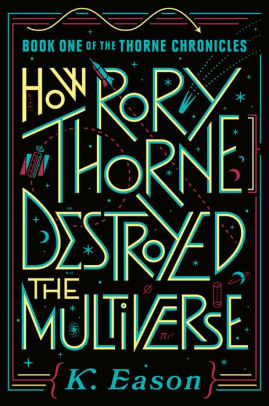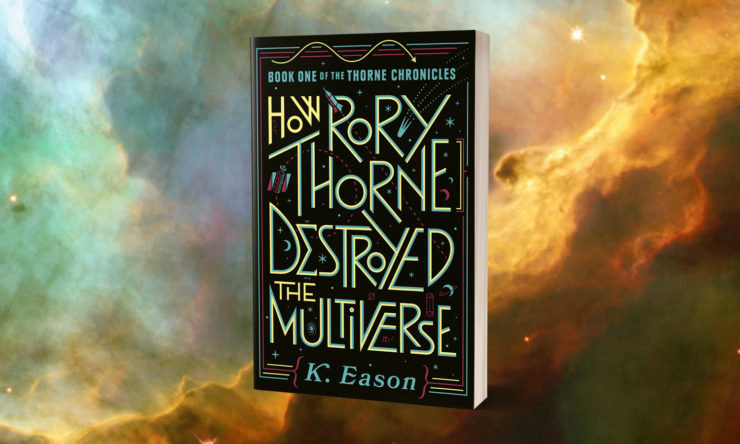In How Rory Thorne Destroyed the Multiverse, K. Eason takes a classic fantasy script—of a royal daughter being given gifts by Faeries and the consequences thereof–and upends it right from the get go. For, you see, this Royal Family rules not a typical Secondary World fantasy kingdom, but a Space Kingdom (actually technically a Consortium).
How Rory Thorne Destroyed the Multiverse leans heavily and often on its boundary position between science fiction, fantasy, and folklore, continually defying expectations by clever genre switching. Our protagonist is the titular heroine, Rory Thorne. Born to a line that has had only sons for generations, her parents set up the fairy ceremony thinking that faeries are not real, and that the proceedings are a pro forma fantasia. When thirteen (including the antagonistic last of their number) faeries show up to give baby Rory Thorne their blessings, the novel becomes delightfully unclear about which genre bucket it falls into. The fairies exit the narrative quickly and permanently, but the mixture of science-fiction and fairy tales continues on throughout the book.
The key faerie gift (from that antagonistic 13th fairy) that Rory received is the ability to see the truth behind lies. It is meant as a curse, and the blocking of the scene is set so that this gift is unknown to Rory’s family. More than any other of Rory’s traits, it is the one that the novel comes to time and again, reinforcing her dislike for it, and reinforcing her social and emotional intelligence. We get a good sense of the no-nonsense, full-throttle-ahead nature of Rory. Sometimes this is tempered by her advisors, friends, and guards (especially the delightful Grytt, easily my second favorite character) but Rory is a force of nature, and the first section of the novel makes that clear.
As the Princess of a space kingdom, the fairy tale expectation is that there will be a marriage to a handsome prince of an neighboring kingdom. Except the novel plays with expectations, so things don’t go as planned. There is a terrorist attack on a meeting of the two polities that leaves casualties on both sides, and the threat of potential war. The prince in question, Prince Ivar, does not make a good impression on their first meeting as children. To add in another fairy tale trope, there is an Evil Regent who has his own ideas about what the post-attack political landscape should be. Rory is bundled off to the space station Urse to eventually marry her future husband, but of course, the Regent has a plan to seize power, and thus the bulk of the novel is the tension between Rory and her space station hosts, as she starts to uncover just how dangerous local politics can be. And sometimes, a Princess must take action to rescue a Prince.
The novel’s space opera setting also contains some fairy tale magic—or more correctly, Arithmancy. Arithmancy is a form of number-based magic that feels and acts like a form of programming; it is not used to make fireballs to take care of approaching troopers, but rather to get past locks, or hack into security cameras to fool the opposition as to what is happening, or take over control of robots. There are a couple of uses that keep it from just being hacking under another name, revolving mainly around auras. But it is a scientific magic in a mold similar to Heinlein’s Glory Road.
Buy the Book


How Rory Thorne Destroyed the Multiverse
There is a breezy, told-tale feel to the pattern of the narrative. It’s very explicitly a tale being told to us from a narrator who has put together events (especially ones outside of Rory’s point of view) and cannot resist foreshadowing, editorializing, and otherwise commenting on the action itself. It lends itself to a shorthand in events now and again that keeps the book manageable and with good flow. All this leads to a narrative that allows some things to be very neatly summarized rather than pedantically spelled out, at the same time allowing for discussions and sidebars as needed. A discussion of Arithmancy and its nature (whether or not it is really “magic”) can be shoehorned in without clunkiness. This is part of that overall very breezy and easy flowing voice of the novel, which makes it a pleasure to read. It really does feel like a fairy tale plot in a space opera setting, reading it on an e-reader on a space station rather than a book of Grimm’s tales.
This is where the novel is the strongest. I found the characters reasonably complex and interesting, some more than others, but what drew me and kept me reading this novel is the narrator’s voice, commentary and general omniscient point of view. Rory is a good tentpole as a plot driver to take charge of her own fate, but it is how the story was told that kept me turning pages, even more than the actual story and characters itself. The novel teases that this is first of a series, and the narrator certainly indicates that there is much more to Rory’s story. If Eason can keep the tone and voice along with the central character, more books of Rory’s story would be most welcome.
How Rory Thorne Destroyed the Multiverse is available from DAW.
An ex-pat New Yorker living in Minnesota, Paul Weimer has been reading sci-fi and fantasy for over 30 years. An avid and enthusiastic amateur photographer, blogger and podcaster, Paul primarily contributes to the Skiffy and Fanty Show as blogger and podcaster, and the SFF Audio podcast. If you’ve spent any time reading about SFF online, you’ve probably read one of his blog comments or tweets (he’s @PrinceJvstin).










